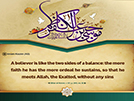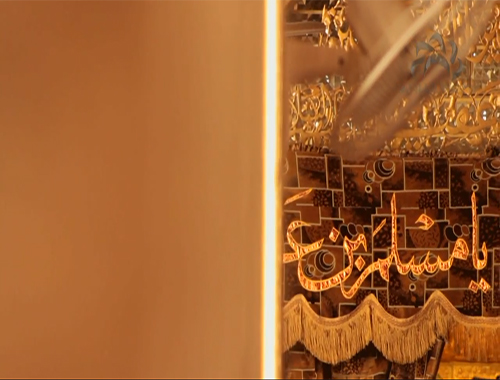His Commandments to Abd Allah Bin Jundub:
- Details
- Hits: 3534
His Commandments to Abd Allah Bin Jundub:
Abd Allah b. Jundub al- Bajali al- Kuff was the Companion of al- Sâdiq, al- Kâzim, .and al- Ridâ, peace be on them. He was the agent of al- Kazim and al- Ridâ. He was a worshipper, and his rank was very important for the Imams. In his book ‘al- Rijâl’, al- Kashy has mentioned that Abd Allah b. Jundub said to AbU al- Hasan, peace be on him:” Are you satisfied with me?” AbO al- Hasan answered:” By Allah, yes. Allah and His Apostle are satisfied with you, too.”
Al- Sâdiq gave him commandments which have valuable sermons. We have mentioned some of them. He, peace be on him, said:’ Bin Jundub, he who depends on his deed perishes, and he who commits sins is not saved with Allah’s mercy.”’ Bin Jundub said:” Then, who is saved?” Al- Sädiq
said:” Those who are between fear and hope. It is as if that their hearts were in the claws of the bird because of their eagerness for the reward and fear of chastisement.”
“Bin Jundub, Whoever is pleased with that Allah will marry him to young ladies having eyes with a marked contrast between white and black, and crown him with the light, then must delight his believing brother.”
“Bin Jundub, the Satan has snares with which he catch (people). So, beware of his snares and nets.” He (Bin Jundub) said:” Son of the Prophet of Allah, may Allah bless him and his family, what are his snares and nets?” He (al- Sadiq) said:” As for his snares, he (the Satan) prevent (you) from treating the brothers kindly, and as for his nets, he (orders you) to sleep during the time of the prayers which Allah has imposed (on you). Indeed, to move the feet to visit the brothers and to treat them kindly is the best way to worship Allah. Woe unto those who are heedless from the prayers, who sleep during the time of the prayers, who mock at Allah and His verses in the Koran, ‘Surely they shall have no portion in the hereafter, and Allah will not speak to them, nor will he look at them on the Day of Resurrection nor will He purify them, and they shall have a painful chastisement.’
“Bin Jundub, whoever runs to fulfill the need of his brother is like him who runs between Safa and Marwa, and whoever fulfills his need is like him who sacrifice his blood in the way of Allah on the day of the (Battle) of Badr and ‘Uhud, and Allah did not punish any nation but when it disdained the rights of their poor brothers.”
“Bin Jundub, if you wish like to neighbor the Great (Allah) in His House and dwell Paradise near him, then regard the life in this world as low, remember death frequently, do not save up (money) for tomorrow, and know that what you have advanced is for you, and what you have delayed is against you.”
“Bin Jundub, whoever deprives himself of his earn, indeed, collects to other than him, whoever obeys his whim, surely, obeys his enemy, and whoever fears Allah, Allah guarantees what has made him worried in here and the hereafter and keeps for him what has disappeared from him. Feeble is he who does not prepare patience for every tribulation, gratefulness for every blessing, and ease for every hardship. Habituate yourto every misfortune in child, money and progeny. Indeed, He (Allah) takes His loan and takes His gift to try with them your patience and your gratefulness. Hope Allah the hope which does not lead to disobedience and fear Him the fear which does not dash your hope of his mercy. Do not be deceived by he words of the ignorant nor with their praise, for you will be proud, haughty, and conceited with your deeds. Indeed, the best acts are worship and humbleness. Do not lose your property, which you will leave after your death, to reform the property of others, Be satisfied with what Allah has
predestined for you. Do not look but at what you have. Do not wish for what you cannot obtain, for whoever gets satisfied gets full, and whoever is dissatisfied is not full. Take your portion from your life in the hereafter. Do not be ungrateful during riches, nor be impatient during poverty. Do not be rude that people hate your nearness. Do not be feeble lest he who knows you should disdain you. Do not dispute with those who are superior to you. Do not scorn those who are inferior to you. Do not dispute with the people of authority. Do. not obey the foolish. Think of every matter before you start to know its beginning and its end. Regard your self as an enemy to make it good. If you do a person a favor, do not spoil it with much reminding. Rather, do a better one than it, for that makes your manner good and achieves your reward in the hereafter. And cleave to silence to be regarded as meek whether your are ignorant or knowledgeable. Indeed, silence is good with the knowledgeable and as a cover for you with the ignorant.”
Al- Sãdiq, peace be on him, quoted here some commandments of ‘Isa (Jesus), peace be on him, to his companions:” And beware of looking, for it plant an appetite in the heart. It is an enough trail for its owner. Blessed is he who puts his sight in his heart and does not put his sight in his eye. Do not consider the defects of people as masters, and consider their defects as servants. Indeed, people are inflected and healthy. So, have mercy on the inflected and thank Allah for health.”
Then he, peace be on him, said:” Bin Jundub, visit him who abandons you, give him who deprives you (of your right), treat kindly him who mistreats you, greet him who abuses you, do justice to him who quarrels with you, and forgive him who wrongs you as you want him to forgive you. So, take a lesson from Allah’s forgiveness for you. Do you not see that His sun shines over the chaste and the unchaste and His rain comes down to the righteous and the sinners.aa
“Bin Jundub, Islam is naked, so its clothe is modesty, its embellishment is solemnity, its manhood is the good deed, and its pillar is piety. Every thing has a foundation; the foundation of Islam is our love, we, the (ahl al Bayt).”’[1]
Notes: _______________________________________
1 Bihär al- Anwar, 78/279/1.
------------------------------------------------------
Taken From : Imam Al-Sadiq By Shaykh Mohammed al-Husayn al-Muzaffar , Translator : Jasim al-Rasheed











